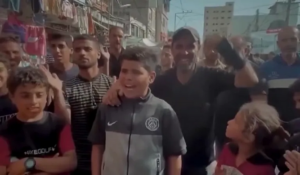Child singer who called attention to Gazans’ suffering and Arab silence killed in Israeli airstrike

Hassan Ayad sings at the centre of the crowd in a video that went viral on social media
Nagham Zbeedat reports in Haaretz on 7 May 2025:
Hassan Ayad, a 14-year-old Palestinian singer from the Nuseirat refugee camp in central Gaza, was killed in an Israeli airstrike on Monday according to reports in Arab and Palestinian media.
After news of his death spread, a video resurfaced showing Hassan walking through the shattered streets of Gaza, singing: “From the skies, we tasted death – a strike from land and sea.” Beside him stood his father, Alaa Ayad.
Ayad’s song drew attention to the suffering of Gazans during the war, calling out Arab countries who are “sound asleep” instead of offering support to the people of Gaza.
“Sometimes, you feel a deep, soul-wrenching sense of loss for someone you’ve never met,” wrote Mahmoud, a journalist and senior producer at Qatari Alaraby TV, in a post on X. “Today, our collective loss is the child singer Hassan Ayad – a loss for all of Gaza. But his voice will forever whisper in our weary minds: ‘Just cry out, O Lord.'” His post included a video of Hassan singing the line.
Dauod Saleh, a friend of Hassan’s father who lives in Ramallah, recalled a video the family had sent him – Hassan and Alaa singing together to celebrate Saleh’s birthday. “A deep ache never leaves my heart over the loss of the martyred child, Hassan Alaa Ayad,” he wrote in a Facebook post. “I cannot imagine how his patient, resilient and noble father is coping, nor how his family is enduring this pain.”
Hassan, Saleh said, was a “radiant child full of energy, vitality and liveliness,” shaped by a father “who instilled in him the deepest love for Palestine and unwavering values of belonging and resistance. Despite all this oppression, Hassan and his father were a mirror of hope, resilience, perseverance, generosity and sacrifice […].”
Saleh, still holding on to that birthday video, added: “Even though Gaza had nothing left that could bring joy, they transcended time and place, singing like nightingales, for friends, for family, for the resistance, for the homeland, for the people.”
West Bank-based Filmmaker Rashid Masharawi, who had worked with Hassan, also shared a heart-wrenching farewell on Facebook. “Today, Hassan Ayad was martyred, the child who gifted me a song from Gaza,” he said. “He sang for the Zero Distance films with his sweet, tender and pained child’s voice. He was a victim of an Israeli airstrike on Nuseirat refugee camp. We are losing our souls daily, Hassan… Hassan the bright one, Hassan the artist, Hassan the martyr… You broke my heart, Hassan.”
Huda Naim, a journalist based in Gaza who collaborated with Hassan’s family on a music video for Palestine TV, said his parents were entirely invested in his dream. “They wanted the world to hear his voice, and for him to have a chance to share his talent with the world,” Naim wrote on X. “Now, that voice has been silenced by war.”
In an interview ten months ago with Egypt’s Al-Ghad TV, Alaa Ayad shared that he had once performed himself, and during the war, began encouraging others, including his son Hassan, to sing patriotic songs. Together, father and son quickly gained recognition across the Arab world for their moving performances, which captured the endurance and heartbreak of life under bombardment.
After Hassan’s death, a video of Alaa emerged online, showing him standing in the middle of a crowd, leading a chant: “Netanyahu, listen to our dreams: death for the sake of God, carry Hassan to his mother.” His words, urging mourners to carry his son’s body, carried deep emotional and cultural resonance. In Palestinian tradition, the phrase evokes the image of a martyr being wedded to the afterlife, carried toward peace and reunited with his grieving mother.
Palestinian writer Khaled Safi, based in Istanbul, reflected on the bond between Alaa Ayad and his son: “Alaa always pushed Hassan forward with pride, seeing him as his heir in the art of popular Zajal poetry. Despite his young age, Hassan had remarkable talent and presence […]”.
For many, Hassan’s songs will continue to reverberate far beyond his brief life. As Saleh put it, “Each time I watch that video, the burning in my heart grows, as do the pain and sorrow. But so does the pride and love, knowing that Hassan, the artist, the human being, the gentle soul, the innocent child, the martyr, once sang for me.”
This article is reproduced in its entirety
